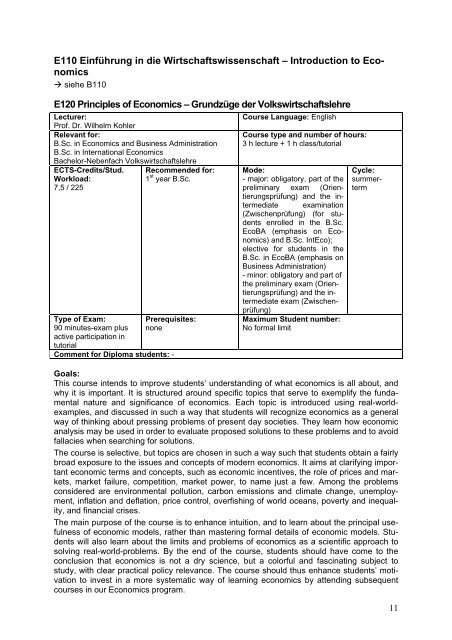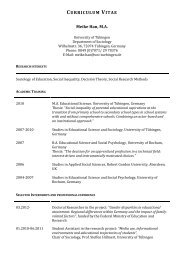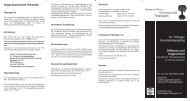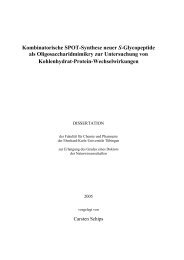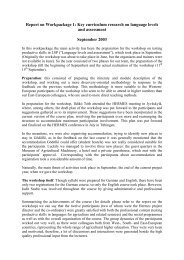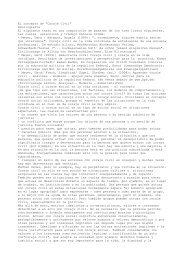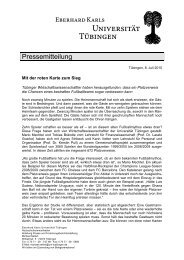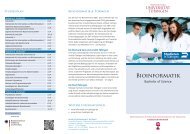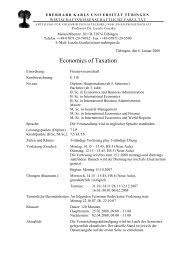Modulhandbuch Wirtschaftswissenschaft - Universität Tübingen
Modulhandbuch Wirtschaftswissenschaft - Universität Tübingen
Modulhandbuch Wirtschaftswissenschaft - Universität Tübingen
Sie wollen auch ein ePaper? Erhöhen Sie die Reichweite Ihrer Titel.
YUMPU macht aus Druck-PDFs automatisch weboptimierte ePaper, die Google liebt.
E110 Einführung in die <strong>Wirtschaftswissenschaft</strong> – Introduction to Economics<br />
siehe B110<br />
E120 Principles of Economics – Grundzüge der Volkswirtschaftslehre<br />
Lecturer:<br />
Prof. Dr. Wilhelm Kohler<br />
Relevant for:<br />
B.Sc. in Economics and Business Administration<br />
B.Sc. in International Economics<br />
Bachelor-Nebenfach Volkswirtschaftslehre<br />
ECTS-Credits/Stud. Recommended for:<br />
Workload:<br />
1<br />
7,5 / 225<br />
st year B.Sc.<br />
Type of Exam:<br />
90 minutes-exam plus<br />
active participation in<br />
tutorial<br />
Prerequisites:<br />
none<br />
Comment for Diploma students: -<br />
Course Language: English<br />
Course type and number of hours:<br />
3 h lecture + 1 h class/tutorial<br />
Mode:<br />
- major: obligatory, part of the<br />
preliminary exam (Orientierungsprüfung)<br />
and the intermediate<br />
examination<br />
(Zwischenprüfung) (for students<br />
enrolled in the B.Sc.<br />
EcoBA (emphasis on Economics)<br />
and B.Sc. IntEco);<br />
elective for students in the<br />
B.Sc. in EcoBA (emphasis on<br />
Business Administration)<br />
- minor: obligatory and part of<br />
the preliminary exam (Orientierungsprüfung)<br />
and the intermediate<br />
exam (Zwischen-<br />
prüfung)<br />
Maximum Student number:<br />
No formal limit<br />
Cycle:<br />
summer-<br />
term<br />
Goals:<br />
This course intends to improve students’ understanding of what economics is all about, and<br />
why it is important. It is structured around specific topics that serve to exemplify the fundamental<br />
nature and significance of economics. Each topic is introduced using real-worldexamples,<br />
and discussed in such a way that students will recognize economics as a general<br />
way of thinking about pressing problems of present day societies. They learn how economic<br />
analysis may be used in order to evaluate proposed solutions to these problems and to avoid<br />
fallacies when searching for solutions.<br />
The course is selective, but topics are chosen in such a way such that students obtain a fairly<br />
broad exposure to the issues and concepts of modern economics. It aims at clarifying important<br />
economic terms and concepts, such as economic incentives, the role of prices and markets,<br />
market failure, competition, market power, to name just a few. Among the problems<br />
considered are environmental pollution, carbon emissions and climate change, unemployment,<br />
inflation and deflation, price control, overfishing of world oceans, poverty and inequality,<br />
and financial crises.<br />
The main purpose of the course is to enhance intuition, and to learn about the principal usefulness<br />
of economic models, rather than mastering formal details of economic models. Students<br />
will also learn about the limits and problems of economics as a scientific approach to<br />
solving real-world-problems. By the end of the course, students should have come to the<br />
conclusion that economics is not a dry science, but a colorful and fascinating subject to<br />
study, with clear practical policy relevance. The course should thus enhance students’ motivation<br />
to invest in a more systematic way of learning economics by attending subsequent<br />
courses in our Economics program.<br />
11


